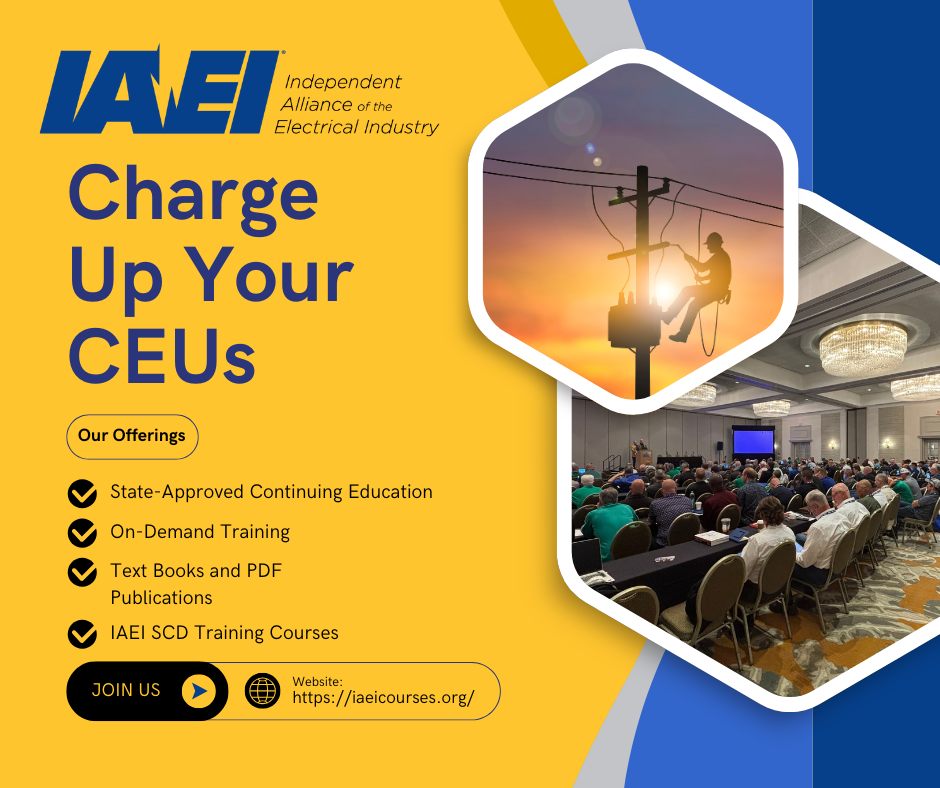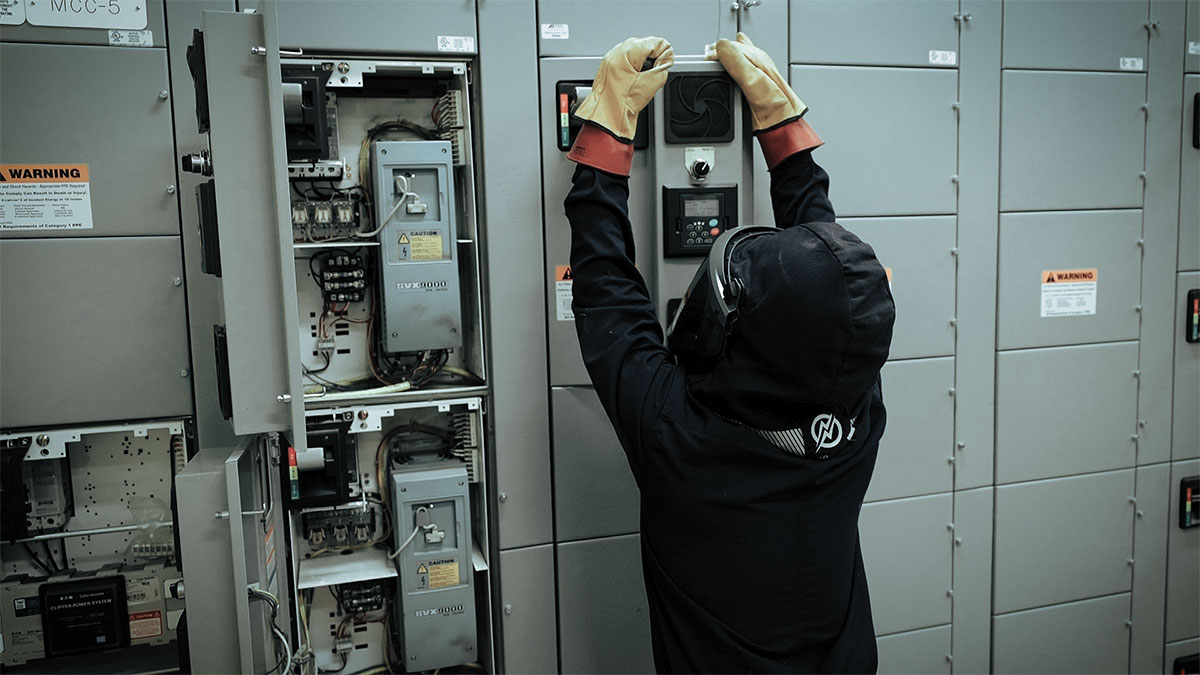Over the last few years, research has shown the construction trades have seen a decline in professionals entering the industry. Many have hinted that the same is happening in the electrical trades. With May being National Electrical Safety Month, it has made me think about the crucial role safety plays in workforce development. As older professionals leave, a younger generation will need to be properly trained. An improperly trained workforce is more at risk for making unsafe choices involving potential electrical hazards. A few ways to help train a safe workforce are through apprenticeships, certifications, and continuing education. A change in overall workforce development will occur when more states make programs like these a requirement of licensure within their state.
Trade-based apprenticeship programs are a great tool to help develop a strong and safe workforce. The U.S. Bureau of Labor Statistics (BLS) has a list on its website of occupations with apprenticeship programs. Being a master electrician in Michigan, I will refer to their electrical apprenticeship requirements as an example. Here, the law requires an individual to be properly licensed to perform any electrical wiring. As a result, a person who is employed as an electrical apprentice must be participating in an approved electrical apprenticeship program that is equivalent to or exceeds the requirements imposed by the Office of Apprenticeship in the United States Department of Labor to receive their apprentice registration from the state. The programs in Michigan consist of a minimum of 576 hours of schooling based on different factors like motors, motor controls, pipe bending, load calculations, wire sizing, and safety, to name a few. The program is minimally a four-year program that is to be done while the person is actively working as an apprentice in the electrical trade. An apprentice must be directly supervised by a properly licensed individual, which can be both good and bad. The good part is the direct supervision requirement where the mentor passes down knowledge on the National Electrical Code® (NEC®), installation techniques, and other tricks of the craft to the apprentice. The bad part is that old habits can also get passed down, which could include unsafe habits like not wearing personal protective equipment (PPE) when needed. I have heard numerous seasoned electricians exclaim, “It’s okay; I never got hurt doing it that way.” But luck is not something we should rely on. Electrical apprenticeship programs are very structured because it is easier to instill good habits at the beginning of a career than to try and break old bad habits later in life.
Apprenticeship programs nationwide may vary in duration and as a requirement for licensure in particular states. Some of the electrical programs may focus on different subject areas, such as solar photovoltaic (PV) systems or electric vehicles (EVs), but most will cover areas commonly used by an electrician, like math, the NEC, state-specific amendments, and safety training. Safety education should include Occupational Safety and Health Administration (OSHA) courses, as well as electrical safety training, such as National Fire Protection Association (NFPA) courses based on NFPA 70E®, Standard for Electrical Safety in the Workplace®. Typically, an apprenticeship is the first rung on the ladder to a professional career as an electrician or electrical inspector. No matter the length or subjects covered in the apprenticeship program, the developing workforce can be taught good work habits and safe practices when working with electricity.
While looking up information around apprenticeship programs, I noticed that there were no apprenticeships specific to electrical inspectors of any kind. So, the only training they have likely received is through their electrical apprenticeship and work experience. Should there be a required apprenticeship program for electrical inspectors? Maybe, but if they do, it could require more states to mandate an electrical inspector certification with an exam or a mentorship program, or maybe require a separate test for an electrical inspector registration. Remember, most inspectors’ knowledge comes from work experience on the electrical systems they’ve installed and their initial electrical apprenticeship program days. Don’t get me wrong, this is good training. Based on my personal field experience I thought I had a good grasp on the NEC as it related to installing electrical wiring, but then I became an inspector and realized how much I really didn’t know. I was lucky; my first electrical inspector job allowed me the privilege to work alongside an experienced electrical inspector who created a mentorship atmosphere, teaching me the ways of the job without belittling me when I messed up. Initially, I found myself writing a code violation because I wouldn’t have installed it that way myself. My mentor was quick to remind me that a cited violation needed to be supported by a code section and not supported by my opinion as a master electrician. A required inspector certification or an exam may have helped me avoid that embarrassing discovery.
Part of developing the workforce is also the ability to keep growing in experience. Because technology in the electrical industry is rapidly changing, we need to understand the role continuing education plays in the continual development of the workforce. Many of us were initially trained on the old reliable single pole light switch and receptacle, but now there is a newer system called Class 4 power or fault managed power (FMP) systems. This is rapidly developing technology that could eventually end up in residential homes. FMP can carry up to 450 volts and requires specific cables and components that must be listed as a system to comply with the NEC. I’m not sure there are many of us who have installed or inspected many of these to date. Therefore, it is vital that electrical inspectors and electricians keep up to date on newer technology so they can make accurate installations and inspections. Continuous learning is tantamount to maintaining a well-developed and safe workforce. This may require taking additional classes like NFPA’s NEC online training or Safe Electrical Work Practices course, or even system-specific training. Some states require continuing education for the workforce to maintain their electrical license or inspector registration.
Michigan is one of those states that have requirements for continuing education to maintain electrical licenses and inspector registrations. I regularly attend electrical training courses sponsored by inspector organizations like IAEI. When I’m there, I have noticed that many participants seem closer to retirement, reinforcing what we’re seeing in the field. And this has made me think of another question. How are electrical inspectors replenishing their ranks? We have advertisements and events to attract people into the electrical industry through apprenticeships, but not for inspectors. Currently, the ranks are mostly being filled through the transition from an electrician in the field into an inspector role. Often these are electricians who have many years vested in the trade and are getting tired of doing the more physical work on the job. This means they may not have a lot of time left in their career to spend as an inspector. We need to continue to promote the role of an electrical inspector in a positive light to attract a wide variety of candidates. As an inspector myself, I believe that if electrical inspectors can begin to use their platform to educate electricians and apprentices on the job site, they may be able to help increase enrollment in the inspector ranks.
There are many aspects around the development of a strong and safe workforce. Apprenticeship programs are the part of the initial development stage where professionals learn good and safe work habits early in their career, often using certifications with exams to test a person’s knowledge. Continuing education courses throughout the year keep the workforce up to date on new codes and developing technology. Ignoring even one of these steps could result in the underdevelopment of the employer’s workforce.
For electrical apprenticeships, contact your local electrical contractors to see what opportunities are available. For continuing education opportunities, there are several organizations such as IAEI or NFPA that offer training and certification opportunities; NFPA’s electrical inspectors section is also a great way to network with electrical inspectors across the nation. Whichever road you choose, just remember that a better-educated and developed workforce is a safer one.
Important Notice: Any opinion expressed in this column is the personal opinion of the author and does not necessarily represent the official position of NFPA or its Technical Committees. In addition, this piece is neither intended, nor should it be relied upon, to provide professional consultation or services.











Find Us on Socials